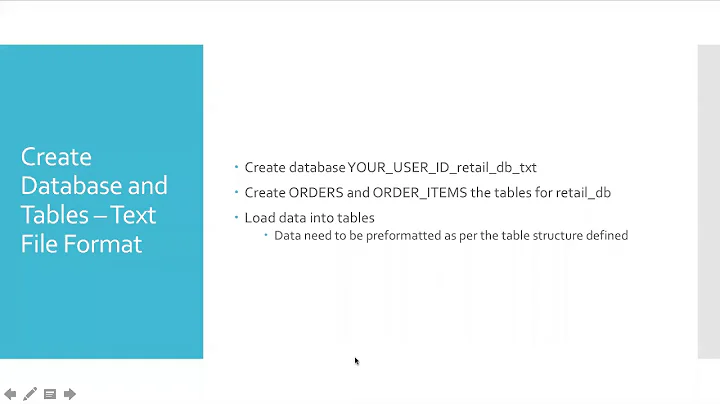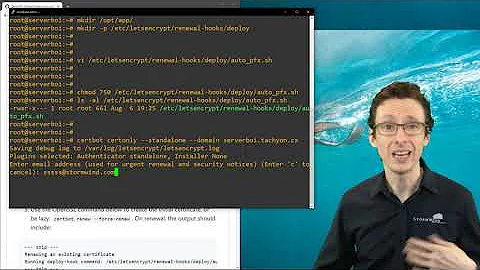Convert ls -l output format to chmod format
Solution 1
Some systems have commands to display the permissions of a file as a number, but unfortunately, nothing portable.
zsh has a stat (aka zstat) builtin in the stat module:
zmodload zsh/stat
stat -H s some-file
Then, the mode is in $s[mode] but is the mode, that is type + perms.
If you want the permissions expressed in octal, you need:
perms=$(([##8] s[mode] & 8#7777))
BSDs (including Apple OS/X) have a stat command as well.
stat -f %Lp some-file
(without the L, the full mode is returned, in octal)
GNU find (from as far back as 1990 and probably before) can print the permissions as octal:
find some-file -prune -printf '%m\n'
Later (2001, long after zsh stat (1997) but before BSD stat (2002)) a GNU stat command was introduced with again a different syntax:
stat -c %a some-file
Long before those, IRIX already had a stat command (already there in IRIX 5.3 in 1994) with another syntax:
stat -qp some-file
Again, when there's no standard command, the best bet for portability is to use perl:
perl -e 'printf "%o\n", (stat shift)[2]&07777' some-file
Solution 2
You can ask GNU stat to output the permissions in octal format by using the -c option. From man stat:
-c --format=FORMAT use the specified FORMAT instead of the default; output a newline after each use of FORMAT ⋮ %a access rights in octal ⋮ %n file name
So in your case:
bash-4.2$ ls -l foo
-rw-r--r-- 1 manatwork manatwork 0 Apr 7 19:43 foo
bash-4.2$ stat -c '%a' foo
644
Or you can even automate it by formatting stat's output as valid command:
bash-4.2$ stat -c "chmod %a '%n'" foo
chmod 644 'foo'
bash-4.2$ stat -c "chmod %a '%n'" foo > setpermission.sh
bash-4.2$ chmod a= foo
bash-4.2$ ls -l foo
---------- 1 manatwork manatwork 0 Apr 7 19:43 foo
bash-4.2$ sh setpermission.sh
bash-4.2$ ls -l foo
-rw-r--r-- 1 manatwork manatwork 0 Apr 7 19:43 foo
The above solution will also work for multiple files if using a wildcard:
stat -c "chmod -- %a '%n'" -- *
Will work correctly with file names containing whitespace characters, but will fail on file names containing single quotes.
Solution 3
To convert from the symbolic to octal notation, I once came up with:
chmod_format() {
sed 's/.\(.........\).*/\1/
h;y/rwsxtSTlL-/IIIIIOOOOO/;x;s/..\(.\)..\(.\)..\(.\)/|\1\2\3/
y/sStTlLx-/IIIIIIOO/;G
s/\n\(.*\)/\1;OOO0OOI1OIO2OII3IOO4IOI5IIO6III7/;:k
s/|\(...\)\(.*;.*\1\(.\)\)/\3|\2/;tk
s/^0*\(..*\)|.*/\1/;q'
}
Expanded:
#! /bin/sed -f
s/.\(.........\).*/\1/; # extract permissions and discard the rest
h; # store a copy on the hold space
# Now for the 3 lowest octal digits (rwx), translates the flags to
# binary where O means 0 and I means 1.
# l, L are for mandatory locking (a regular file that has 02000 on
# and not 010 on some systems like Linux). Some ls implementations
# like GNU ls confusingly use S there like for directories even though
# it has nothing to do with setgid in that case. Some ls implementations
# use L, some others l (against POSIX which requires an uppercase
# flag for extra flags when the execution bit is not set).
y/rwsxtSTlL-/IIIIIOOOOO/
x; # swap hold and pattern space, to do a second processing on those flags.
# now only consider the "xXlLsStT" bits:
s/..\(.\)..\(.\)..\(.\)/|\1\2\3/
y/sStTlLx-/IIIIIIOO/; # make up the 4th octal digit as binary like before
G; # append the hold space so we now have all 4 octal digits as binary
# remove the extra newline and append a translation table
s/\n\(.*\)/\1;OOO0OOI1OIO2OII3IOO4IOI5IIO6III7/
:k
# translate the OOO -> 0 ... III -> 7 in a loop
s/|\(...\)\(.*;.*\1\(.\)\)/\3|\2/
tk
# trim leading 0s and our translation table.
s/^0*\(..*\)|.*/\1/;q
That returns the octal number from the output of ls -l on one file.
$ echo 'drwSr-sr-T' | chmod_format
7654
Solution 4
This command on Mac under sh
stat -f "%Lp %N" your_files
if you only want the numeric permission, use %Lp only.
for example:
stat -f "%Lp %N" ~/Desktop
700 Desktop
The 700 is the numeric permission which can be used in chmod, and Desktop is the filename.
Solution 5
Here's an answer to question Y (ignoring question X), inspired by the OP's attempt:
#!/bin/bash
LC_COLLATE=C
while read ls_out
do
extra=0
perms=0
for i in {1..9}
do
# Shift $perms to the left one bit, so we can always just add the LSB.
let $((perms*=2))
this_char=${ls_out:i:1}
# If it's different from its upper case equivalent,
# it's a lower case letter, so the bit is set.
# Unless it's "l" (lower case L), which is special.
if [ "$this_char" != "${this_char^}" ] && [ "$this_char" != "l" ]
then
let $((perms++))
fi
# If it's not "r", "w", "x", or "-", it indicates that
# one of the high-order (S/s=4000, S/s/L/l=2000, or T/t=1000) bits
# is set.
case "$this_char" in
([^rwx-])
let $((extra += 2 ** (3-i/3) ))
esac
done
printf "%o%.3o\n" "$extra" "$perms"
done
The above contains a few bashisms. The following version seems to be POSIX-compliant:
#!/bin/sh
LC_COLLATE=C
while read ls_out
do
extra=0
perms=0
for i in $(seq 1 9)
do
# Shift $perms to the left one bit, so we can always just add the LSB.
: $((perms*=2))
this_char=$(expr "$ls_out" : ".\{$i\}\(.\)")
# Lower case letters other than "l" indicate that permission bits are set.
# If it's not "r", "w", "x", or "-", it indicates that
case "$this_char" in
(l)
;;
([a-z])
: $((perms+=1))
esac
# If it's not "r", "w", "x", or "-", it indicates that
# one of the high-order (S/s=4000, S/s/L/l=2000, or T/t=1000) bits
# is set.
case "$this_char" in
([!rwx-])
: $((extra += 1 << (3-i/3) ))
esac
done
printf "%o%.3o\n" "$extra" "$perms"
done
Notes:
- The
LC_COLLATE=Ctells the shell to treat letter sequence range patterns as using the ASCII order, so[a-e]is equivalent to[abcde]. In some locales (e.g., en_US),[a-e]is equivalent to[aAbBcCdDeE](i.e.,[abcdeABCDE]) or perhaps[abcdeABCD]— see Why is the bash case statement not case-sensitive …?) -
In the second version (the POSIX-compliant one):
-
The first
casestatement could be rewritten:case "$this_char" in ([a-km-z]) : $((perms+=1)) esacbut I think the way I have it now makes it easier to see that
lis the letter that's being handled differently. Alternatively, it could be rewritten:case "$this_char" in ([rwxst]) : $((perms+=1)) esacsince
r,w,x,s, andtare the only letters that should ever appear in a mode string (other thanl). -
The second
casestatement could be rewritten:case "$this_char" in ([rwx]) ;; ([A-Za-z]) : $((extra += 1 << (3-i/3) )) esacto enforce the rule that only letters are valid for specifying mode bits. (By contrast, the more succinct version in the full script is lazy, and will accept
-rw@rw#rw%as equivalent torwSrwSrwT.) Alternatively, it could be rewritten:case "$this_char" in ([SsTtLl]) : $((extra += 1 << (3-i/3) )) esacsince
S,s,T,t,L, andlare the only letters that should ever appear in a mode string (other thanr,w, andx).
-
Usage:
$ echo drwxr-xr-x | chmod-format
0755
$ echo -rwsr-sr-x | chmod-format
6755
$ echo -rwSr-Sr-- | chmod-format
6644
$ echo -rw-r-lr-- | chmod-format
2644
$ echo ---------- | chmod-format
0000
And, yes, I know it's better not to use echo with text that might begin
with -; I just wanted to copy the usage example from the question.
Note, obviously, that this ignores the 0th character
(i.e., the leading d/b/c/-/l/p/s/D)
and the 10th (+/./@).
It assumes that the maintainers of ls will never define
r/R or w/W as valid characters in the third, sixth, or ninth position
(and, if they do, they should be beaten with sticks).
Also, I just found the following code, by cas, under How to restore default group/user ownership of all files under /var:
let perms=0
[[ "${string}" = ?r???????? ]] && perms=$(( perms + 400 ))
[[ "${string}" = ??w??????? ]] && perms=$(( perms + 200 ))
[[ "${string}" = ???x?????? ]] && perms=$(( perms + 100 ))
[[ "${string}" = ???s?????? ]] && perms=$(( perms + 4100 ))
[[ "${string}" = ???S?????? ]] && perms=$(( perms + 4000 ))
[[ "${string}" = ????r????? ]] && perms=$(( perms + 40 ))
[[ "${string}" = ?????w???? ]] && perms=$(( perms + 20 ))
[[ "${string}" = ??????x??? ]] && perms=$(( perms + 10 ))
[[ "${string}" = ??????s??? ]] && perms=$(( perms + 2010 ))
[[ "${string}" = ??????S??? ]] && perms=$(( perms + 2000 ))
[[ "${string}" = ???????r?? ]] && perms=$(( perms + 4 ))
[[ "${string}" = ????????w? ]] && perms=$(( perms + 2 ))
[[ "${string}" = ?????????x ]] && perms=$(( perms + 1 ))
[[ "${string}" = ?????????t ]] && perms=$(( perms + 1001 ))
[[ "${string}" = ?????????T ]] && perms=$(( perms + 1000 ))
I have tested this code (but not thoroughly), and it seems to work,
except for the fact that it doesn't recognize l or L in the sixth position.
Note, though,
that while this answer is superior in terms of simplicity and clarity,
mine is actually shorter (counting only the code inside the loop;
the code that handles a single -rwxrwxrwx string, not counting comments),
and it could be made even shorter
by replacing if condition; then …
with condition && ….
Of course, you should not parse the output of ls.
Related videos on Youtube
Comments
-
Tyilo over 1 year
Say I have the following output from
ls -l:drwxr-xr-x 2 root root 4096 Apr 7 17:21 fooHow can I automatically convert this to the format used by
chmod?For example:
$ echo drwxr-xr-x | chmod-format 755I'm using OS X 10.8.3.
-
manatwork about 11 yearsMuch easier with
stat. Do you have it? (It's a GNU tool, so mostly available on Linux, not on Unix.) -
Tyilo about 11 years@manatwork
stat foogives16777219 377266 drwxr-xr-x 119 Tyilo staff 0 4046 "Apr 7 17:49:03 2013" "Apr 7 18:08:31 2013" "Apr 7 18:08:31 2013" "Nov 25 17:13:52 2012" 4096 0 0 /Users/Tyilo. I don't see755in it.
-
-
 Stéphane Chazelas about 11 yearsThe OP mentioned he was on Apple OS/X, so
Stéphane Chazelas about 11 yearsThe OP mentioned he was on Apple OS/X, sochmodwill not be the GNUchmodthere. -
manatwork about 11 yearsThanks for the information, @Tyilo. And sorry, I can not help with OS X's tools.
-
i_saw_drones about 11 yearsTry reading manpage^W^W^W stat(1) on Mac OS X have -f flag for specifying output format, e.g.
stat -f 'chmod %p "%N"' -
 Scott - Слава Україні almost 9 years@StéphaneChazelas: OK, I said
Scott - Слава Україні almost 9 years@StéphaneChazelas: OK, I said#!/bin/shand then used a few bashisms. Oops. But you missed a couple:$((variable++))and$((number**number))don’t seem to be POSIX either (the Standard doesn’t mention**at all, and is squirrelly on++and--). Conversely, I didn’t use[[…]]; that appears only in cas’s answer, which I quoted from here. Also, my answer does handle ‘l’ and ‘L’, and I already pointed out the fact that cas’s answer doesn’t. -
 Stéphane Chazelas almost 9 yearsSorry about l/L [[, I read too quickly. Yes, -- and ++ are not POSIX. POSIX allows shells to implement them, that means you have to write
Stéphane Chazelas almost 9 yearsSorry about l/L [[, I read too quickly. Yes, -- and ++ are not POSIX. POSIX allows shells to implement them, that means you have to write$((- -a))if you want a double negation, not that you may use$((--a))to mean a decrement operation. -
 Stéphane Chazelas almost 9 yearsNote that
Stéphane Chazelas almost 9 yearsNote thatseqis not a POSIX command. You may be able to use the ${var#?} operator to avoid expr. Not that LC_COLLATE will not override LC_ALL -
 Scott - Слава Україні almost 9 years@StéphaneChazelas: OK, you're talking about cas's answer again now, right? He's taking the "lazy" approach of using decimal arithmetic to construct a string that looks like an octal number. Note that all his step values (4000, 2000, 1000, 400, 200, 100, 40, 20, and 10) are decimal numbers. But, since there are no
Scott - Слава Україні almost 9 years@StéphaneChazelas: OK, you're talking about cas's answer again now, right? He's taking the "lazy" approach of using decimal arithmetic to construct a string that looks like an octal number. Note that all his step values (4000, 2000, 1000, 400, 200, 100, 40, 20, and 10) are decimal numbers. But, since there are no8's or9's, and no way to get more than7in any decimal position, he can pull of the charade. … … … … … … … … (This comment is a response to a Stéphane Chazelas comment that disappeared.) -
 Stéphane Chazelas almost 9 yearsYes, I realised that later, which is why I deleted the comment.
Stéphane Chazelas almost 9 yearsYes, I realised that later, which is why I deleted the comment. -
 Stéphane Chazelas almost 9 yearsNote that
Stéphane Chazelas almost 9 yearsNote thatexpr -rwsr-sr-x : ".\{$i\}\(.\)"doesn't work on FreeBSD (invalid option), whileexpr -- -rwsr-sr-x : ".\{$i\}\(.\)"won't work with busybox. So you'd needexpr "x$var" : "x.\{$i\}\(.\)" -
HiTechHiTouch about 7 yearsI used this on the output of
dpkgto set permissions back to "as installed". Thank you for answering the literal question without regard to which command produced the permission string.




